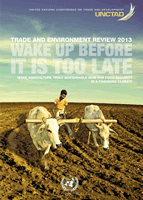
Developing and developed countries alike need a paradigm shift in agricultural development: from a "green revolution" to a "truly ecological intensification" approach. This implies a rapid and significant shift from conventional, monoculture-based and high external-input-dependent industrial production towards mosaics of sustainable, regenerative production systems that also considerably improve the productivity of small-scale farmers. We need to see a move from a linear to a holistic approach in agricultural management, which recognizes that a farmer is not only a producer of agricultural goods, but also a manager of an agro-ecological system that provides quite a number of public goods and services (e.g. water, soil, landscape, energy, biodiversity, and recreation) UNCTAD's Trade and Environment Review 2013 (TER13) contends.
TER13 highlights that the required transformation is much more profound than simply tweaking the existing industrial agricultural system. Rather, what is called for is a better understanding of the multi-functionality of agriculture, its pivotal importance for pro-poor rural development and the significant role it can play in dealing with resource scarcities and in mitigating and adapting to climate change. However, the sheer scale at which modified production methods would have to be adopted, the significant governance issues, the power asymmetries' problems in food input and output markets as well as the current trade rules for agriculture pose considerable challenges.
TER13, entitled Wake up Before it is Too Late: Make Agriculture Truly Sustainable Now for Food Security in a Changing Climate was released on 18 September 2013. More than 60 international experts have contributed their views to a comprehensive analysis of the challenges and the most suitable strategic approaches for dealing holistically with the inter-related problems of hunger and poverty, rural livelihoods, social and gender inequity, poor health and nutrition, and climate change and environmental sustainability - one of the most interesting and challenging subjects of present development discourse.
Agricultural development, the report underlines, is at a true crossroads. By way of illustration, food prices in the period 2011 to mid-2013 were almost 80% higher than for the period 2003-2008. Global fertilizer use increased by 8 times in the past 40 years, although global cereal production has scarcely doubled at the same time. The growth rates of agricultural productivity have recently declined from 2% to below 1% per annum. The two global environmental limits that have already been crossed (nitrogen contamination of soils and waters and biodiversity loss) were caused by agriculture. GHG emissions from agriculture are not only the single biggest source of global warming in the South, besides the transport sector, they are also the most dynamic. The scale of foreign land acquisitions (often also termed land grabbing) dwarfs the level of Official Development Assistance, the former being 5-10 times higher in value than the latter in recent years.
Most important of all, despite the fact that the world currently already produces sufficient calories per head to feed a global population of 12-14 billion, hunger has remained a key challenge. Almost one billion people chronically suffer from starvation and another billion are mal-nourished. Some 70% of these people are themselves small farmers or agricultural laborers. Therefore, hunger and mal-nutrition are not phenomena of insufficient physical supply, but results of prevailing poverty, and above all problems of access to food. Enabling these people to become food self-sufficient or earn an appropriate income through agriculture to buy food needs to take center stage in future agricultural transformation. Furthermore, the current demand trends for excessive biofuel and concentrate animal feed use of cereals and oil seeds, much too high meat-based diets and post-harvest food waste are regarded as given, rather than challenging their rational. Questionably, priority in international policy discussions remains heavily focused on increasing industrial agricultural production, mostly under the slogan "growing more food at less cost to the environment".
The strategy recommended to developing countries of relying on international markets to meet staple food demand, while specializing in the production and export of 'lucrative' cash crops has not produced the intended results, because it relied on low staple food prices and no shortage of supply in international markets, conditions that have drastically changed since the turn of the century. Globalization has also encouraged excessive specialization, increasing scale of production of few crops and enormous cost pressure. All this has aggravated the environmental crisis of agriculture and reduced agricultural resilience. What is now required is a shift towards diverse production patterns that reflect the multi-functionality of agriculture and enhance close nutrient cycles. Moreover, as environmental externalities are mainly not internalized, carbon taxes are the rare exception rather than the rule and carbon-offset markets are largely dysfunctional - all factors that would prioritize regional/local food production through 'logical' market mechanisms - trade rules need to allow a higher regional focus of agriculture along the lines of "as much regionalized/localized food production as possible; as much traded food as necessary".
Climate change will drastically impact agriculture, primarily in those developing countries with the highest future population growth, i.e. in sub-Saharan Africa and South Asia. Against this background, the fundamental transformation of agriculture may well turn out to be one of the biggest challenges, including for international security, of the 21st century. Much slower agricultural productivity growth in the future, a quickly rising population in the most resource-constrained and climate-change-exposed regions and a burgeoning environmental crises of agriculture are the seeds for mounting pressures on food security and the related access to land and water. This is bound to increase the frequency and severity of riots, caused by food-price hikes, with concomitant political instability, and international tension, linked to resource conflicts and migratory movements of starving populations.


